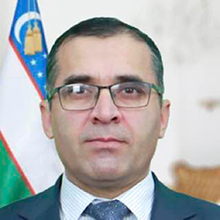Publications
Uzbekistan is creating its own model for combating corruption  Qodir Djuraev, MP, Legislative Chamber of Oliy Majlis (national parliament) of the Republic of Uzbekistan
Qodir Djuraev, MP, Legislative Chamber of Oliy Majlis (national parliament) of the Republic of Uzbekistan
One of the most crucial issues in the rapidly changing world is undoubtedly corruption. The human history suggests that this phenomenon brought even the most powerful nations to the brink of collapse.
Corruption is a perilous misfortune with negative impact on the entire human race, on foundation of any state and society, economic development; it undermines rule of law and sharply weakens public confidence in government, hinders advancement of democratic institutions.
Unfortunately, this problem has not been alien Uzbekistan. Until very recently, the latter had been known as one of those countries with highest perceptions of corruption.
READ MORE
Publications
The likeliest scenarios for tomorrow’s Russia  By Marat Terterov, PhD, Founder, and former Executive Director of the EGF
By Marat Terterov, PhD, Founder, and former Executive Director of the EGF
The folly of predicting Russia’s future
When undertaking the task of seeking to forecast a ‘likely scenario’ for tomorrow’s Russia, one has to start with a caveat – predicting Russia’s future and what fate awaits the country in light of its continued military excursion in Ukraine is like trying to find a needle in a haystack. In other words, it is almost impossible to predict future political developments in Russia with any real certainty. This includes any efforts to predict whether Russia will continue to remain the arch belligerent in Ukraine, or whether it will be prepared to make concessions, or to forecast what impact either (or other) of these developments in the current conflict in Ukraine will have on the Russian regime of Vladimir Putin.
READ MORE
Publications
Will an Armenia-Azerbaijan peace agreement be indefinitely delayed?  By Vasif HUSEYNOV, PhD, Head of Department, AIR Center, Adjunct Lecturer, ADA and Khazar Universities, Baku
By Vasif HUSEYNOV, PhD, Head of Department, AIR Center, Adjunct Lecturer, ADA and Khazar Universities, Baku
2023 ended with positive notes for the Armenia-Azerbaijan peace process, but the new year has so far failed to maintain the momentum. Despite a successful prisoner exchange, and Armenia’s endorsement of Azerbaijan’s COP29 candidacy, recent statements from the respective governments have presented a mixed picture. While the Azerbaijani side has not indicated any setbacks in the ongoing talks yet, the Armenian government has criticized the recent statements by the Azerbaijani leader as unconstructive for the peace process.
Complicating matters further, disagreements have intensified regarding the possible regulations along the Zangezur corridor. The latest developments highlight a disparity in the visions of Russia, Armenia, and Azerbaijan for this corridor. Unfortunately, these developments suggest that the obstacles in the Armenia-Azerbaijan peace treaty talks may be more fundamental, potentially leading to indefinite delays in the process.
READ MORE
Publications
Assessment of poverty indicators in the Republic of Uzbekistan by the end of 2023  The CERR jointly with the Statistics Agency, assessed the level of monetary poverty in Uzbekistan. By the end of 2023, poverty in the country decreased by 3.1 percentage points. The experts explained how the poverty profile has changed and in which regions the incomes of the population have shown the greatest growth.
The CERR jointly with the Statistics Agency, assessed the level of monetary poverty in Uzbekistan. By the end of 2023, poverty in the country decreased by 3.1 percentage points. The experts explained how the poverty profile has changed and in which regions the incomes of the population have shown the greatest growth.
According to the results of the assessment of the Statistics Agency under the President of Uzbekistan, by the end of 2023, the poverty level in Uzbekistan has decreased to 11.0%.
READ MORE
Publications
Armenia and Azerbaijan Address Concerns Over Territorial Integrity  By Vasif HUSEYNOV, PhD, Head of Department, AIR Center, Adjunct Lecturer, ADA and Khazar Universities, Baku
By Vasif HUSEYNOV, PhD, Head of Department, AIR Center, Adjunct Lecturer, ADA and Khazar Universities, Baku
On January 19, Armenian Prime Minister Nikol Pashinyan called for a new constitution in a meeting with senior officials from the Armenian Ministry of Justice. Pashinyan asserted that Armenia needs “a new constitution, not constitutional changes,” adding that the new foundational document would make the country “more competitive and viable in the new geopolitical and regional environment” (Azatutyun.am, January 19). He highlighted that the new constitution would maintain the present parliamentary system and underscored “external security” and “internationally recognized sovereign territory” as the main issues to be addressed. Mutual respect for one another’s territorial integrity remains a sticking point in peace negotiations between Armenia and Azerbaijan. If Yerevan proceeds with Pashinyan’s proposal, the new constitution will eliminate certain hurdles to signing a peace treaty with Baku.
READ MORE
Publications
Baku wants an agreement with Armenia without mediators  By Vasif HUSEYNOV, PhD, Head of Department, AIR Center, Adjunct Lecturer, ADA and Khazar Universities, Baku
By Vasif HUSEYNOV, PhD, Head of Department, AIR Center, Adjunct Lecturer, ADA and Khazar Universities, Baku
On January 8, US Senior Adviser on Caucasus Negotiations Louis Bono visited Yerevan, engaging in discussions with local officials regarding the Armenia-Azerbaijan peace process. The Armenian side reported that one of the issues discussed during this visit was the organization of a meeting of the Armenian and Azerbaijani foreign ministers in Washington. Unlike his previous visits to the region, this trip omitted a visit to Baku, suggesting that it either wasn’t planned, which is unlikely, or that the Azerbaijani side was not open to receiving him. Recent developments between Baku and Yerevan, along with the evolving dynamics of mediator involvement, indicate that Azerbaijan has grown more cautious and sceptical about the role of third parties in the Armenia-Azerbaijan process. As a result, Azerbaijan has advocated for bilateral meetings between the two countries. Baku’s position is primarily related with the potential geopolitical fallout of the upcoming peace deal with Yerevan.
READ MORE
Publications
What Next in Armenia – Azerbaijan Negotiations  By Benyamin POGHOSYAN, PhD, Chairman, Center for Political and Economic Strategic Studies
By Benyamin POGHOSYAN, PhD, Chairman, Center for Political and Economic Strategic Studies
In the late months of 2022 and 2023 there were intensive discussions about the possible signature of the Armenia – Azerbaijan peace agreement. Both international mediators and facilitators, as well as representatives of Armenia and Azerbaijan were making statements that a peace agreement signature is within reach. As we enter 2024, discussions are underway about the potential signature of the Armenia – Azerbaijan agreement in 2024. The December 7, 2023, bilateral statement on the release of Prisoners of War and Armenia’s support of the Azerbaijani bid to host the COP29 in Baku gave more impetus to these hopes. Some believe that the military takeover of Nagorno Karabakh by Azerbaijan in September 2023 made this perspective more realistic, especially as the Armenian government agreed not to include anything on Nagorno Karabakh in the peace agreement.
READ MORE
Publications
Ensuring women's rights is an integral part of the State gender policy in Uzbekistan  Mahinora Mirkhamidova, associate professor of the department International law and Public law disciplines of the University of World Economy and Diplomacy
Mahinora Mirkhamidova, associate professor of the department International law and Public law disciplines of the University of World Economy and Diplomacy
Today over two-thirds of the world's countries are participants in the UN Convention on the Elimination of All Forms of Discrimination Against Women (CEDAW) adopted in 1979. Ensuring women's rights is one of the 17 Sustainable Development Goals, goal 5 specifically aims at “Achieving gender equality and empowering all women and girls.” The issues of ensuring women's rights are reflected in the constitutions of almost all countries, entrenched in their legislation, and hold a significant place in national development plans and strategies.
READ MORE